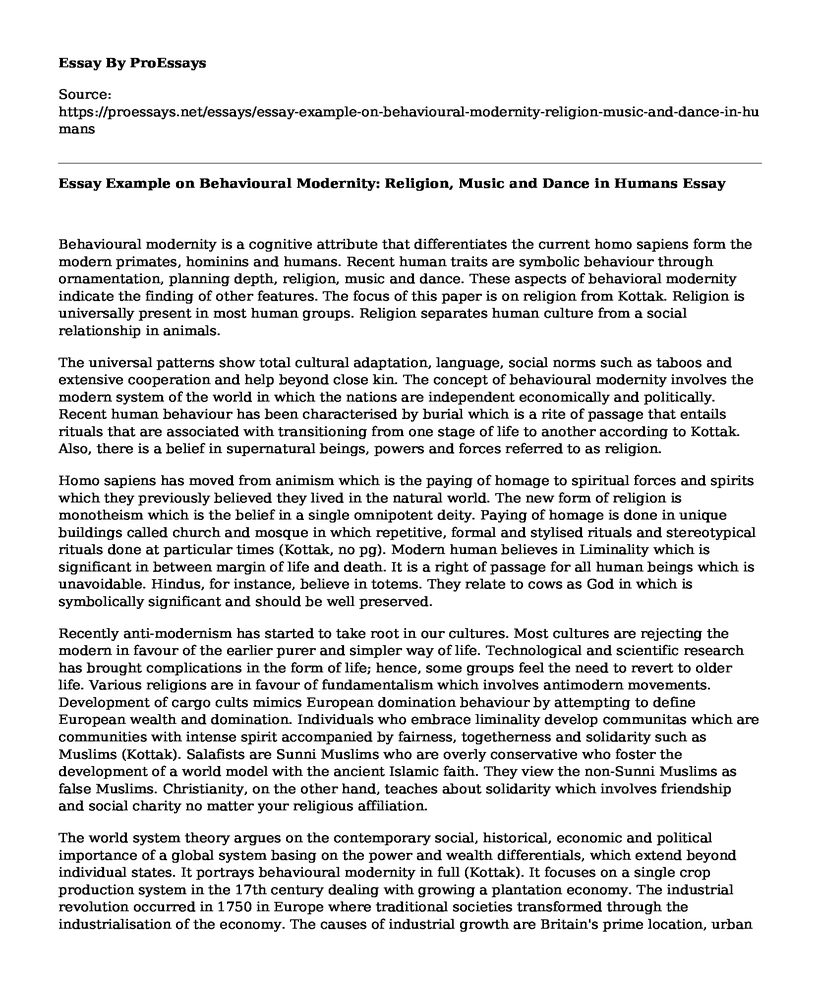Behavioural modernity is a cognitive attribute that differentiates the current homo sapiens form the modern primates, hominins and humans. Recent human traits are symbolic behaviour through ornamentation, planning depth, religion, music and dance. These aspects of behavioral modernity indicate the finding of other features. The focus of this paper is on religion from Kottak. Religion is universally present in most human groups. Religion separates human culture from a social relationship in animals.
The universal patterns show total cultural adaptation, language, social norms such as taboos and extensive cooperation and help beyond close kin. The concept of behavioural modernity involves the modern system of the world in which the nations are independent economically and politically. Recent human behaviour has been characterised by burial which is a rite of passage that entails rituals that are associated with transitioning from one stage of life to another according to Kottak. Also, there is a belief in supernatural beings, powers and forces referred to as religion.
Homo sapiens has moved from animism which is the paying of homage to spiritual forces and spirits which they previously believed they lived in the natural world. The new form of religion is monotheism which is the belief in a single omnipotent deity. Paying of homage is done in unique buildings called church and mosque in which repetitive, formal and stylised rituals and stereotypical rituals done at particular times (Kottak, no pg). Modern human believes in Liminality which is significant in between margin of life and death. It is a right of passage for all human beings which is unavoidable. Hindus, for instance, believe in totems. They relate to cows as God in which is symbolically significant and should be well preserved.
Recently anti-modernism has started to take root in our cultures. Most cultures are rejecting the modern in favour of the earlier purer and simpler way of life. Technological and scientific research has brought complications in the form of life; hence, some groups feel the need to revert to older life. Various religions are in favour of fundamentalism which involves antimodern movements. Development of cargo cults mimics European domination behaviour by attempting to define European wealth and domination. Individuals who embrace liminality develop communitas which are communities with intense spirit accompanied by fairness, togetherness and solidarity such as Muslims (Kottak). Salafists are Sunni Muslims who are overly conservative who foster the development of a world model with the ancient Islamic faith. They view the non-Sunni Muslims as false Muslims. Christianity, on the other hand, teaches about solidarity which involves friendship and social charity no matter your religious affiliation.
The world system theory argues on the contemporary social, historical, economic and political importance of a global system basing on the power and wealth differentials, which extend beyond individual states. It portrays behavioural modernity in full (Kottak). It focuses on a single crop production system in the 17th century dealing with growing a plantation economy. The industrial revolution occurred in 1750 in Europe where traditional societies transformed through the industrialisation of the economy. The causes of industrial growth are Britain's prime location, urban growth and technological advances. Industrialisation causes several socioeconomic improvements including a rise in the national income, low living standards in the working class and poor accommodation.
The bourgeoisie employed the proletariat and proletarianised them due to class consciousness. In the 19th century, reforms brought better conditions of working and improved living standards. Women and children worked for a limited amount of time, and young children removed from factory work. Lenski`s view on advanced industrial societies changed cultural interaction. The colonial period involved imperialism, indirect rule, mission civilisatrice, and direct rule (Kottak no pg). The post-colonial period created settler countries, non-settler countries, neoliberalism, mixed countries, Keynesian economics, and intervention philosophy. After the second world war, communism took root in developing countries by the colonialists. The colonialists were authoritative, post-socialist and totalitarian. The indigenous inhabitants of the developing countries faced partial ethnocide, and some states even had genocide.
Works Cited
Kottak, Conrad Phillip. Cultural anthropology: Appreciating cultural diversity. New York, NY;: McGraw-Hill, 2011.
Cite this page
Essay Example on Behavioural Modernity: Religion, Music and Dance in Humans. (2023, Feb 20). Retrieved from https://proessays.net/essays/essay-example-on-behavioural-modernity-religion-music-and-dance-in-humans
If you are the original author of this essay and no longer wish to have it published on the ProEssays website, please click below to request its removal:
- Essay Sample on Christmas Cards
- The Matrix Between Descartes and Plato - Compare and Contrast Essay Sample
- The Allegory of the Cave - Essay Sample
- Essay Example on Personality: The Role of Family in Shaping Identity
- Essay on 2050 - Humanity's Race Is Transforming: Yuval Noah's Insightful Article
- Family, Hope, & Resilience on Migrant Trail: A Ted Talk by Jon Lowenstein - Essay Sample
- Free Report on Growing Up Trans: Daniel's Journey of Self-Discovery







